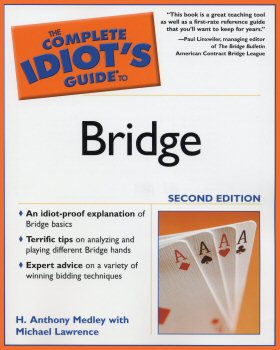| The first edition of Complete Idiot's Guide to Bridge by H. Anthony Medley was the fastest selling beginning bridge book, going through more than 10 printings. This updated Second Edition includes some modern advanced bidding systems and conventions, like Two over One, a system used by many modern tournament players, Roman Key Card Blackwood, New Minor Forcing, Reverse Drury, Forcing No Trump, and others. Also included is a detailed Guide to Bids and Responses, along with the most detailed, 12-page Glossary ever published, as well as examples to make learning the game even easier. Click book to order. | ||
|
Wall Street: Money Never Sleeps (7/10) by Tony Medley Run time 133 minutes. OK for children. This is a cartoon without animation. Gordon Gekko (Michael Douglas), the protagonist of the first Wall Street (1987) who proclaimed that “Greed is good” returns as a convicted felon trying to get back in the game, but his main role is as the father of Winnie Gekko (Carey Mulligan). Jake Moore (Shia LaBeouf) is Winnie’s boyfriend, the young guy trying to leapfrog up the investing ladder, and Bretton James (Josh Brolin) is the bad guy who was instrumental in putting Gordon in jail and is apparently the guy to whose tune all the government regulators dance.
This is more a love story between Winnie and Jake than it is an intelligent examination of what happened on Wall Street to cause Bear Stearns (Keller Zabel Investments in the film, run by Frank Langella) to be thrown to the wolves and the resulting government bailouts. While I don’t expect a Hollywood insider like director Oliver Stone to understand what happened or to lay the blame for the financial collapse of 2008 at the feet of two Democrats, Rep. Barney Frank (D-Mass.) and Sen. Chris Dodd (D-Conn.), “mark to market,” and a bunch of cowardly politicians and political appointees in the Clinton, Bush, and Obama Administrations, which is exactly where it belongs, I did hope for a more knowledgeable setup than what is presented here, which is basically incomprehensible. I defy anyone to explain what the financial problem was in this movie and why they did what they did. However, the people making the decisions in Washington in 2008 probably couldn’t describe the problem and why they did what they did without lying, either.
But this is a movie, and the financial problem is little more than a McGuffin to introduce interesting characters like Gekko and James. Unfortunately, the first hour is a painful effort to set up the financial problem and it was difficult for me to sit through, although the acting of Douglas, Mulligan, and Brolin is superb. After the first hour when the love story gets to be more involving, my interest picked up.
Screenwriter Allan Loeb admitted to this in an interview on CNBC, “When I started I knew I had to tell a human story, to expand upon the character of Gekko, but to tell a real story of human emotions and relationships that had nothing to do with the world of finance, and then set it against the craziest year in the history of finance, probably.” That’s what he did, and it’s the human story that makes the film worth seeing.
Douglas plays these slimy roles, like Gekko and the title role in The Solitary Man, so well that one gets the feeling that he’s not acting, which is the mark of a great actor. He appears as if he’s laughing at you because he just got the better of you, and that pretty much captures the essence of Gordon Gekko.
Mulligan gives another compelling performance (after her Oscar®-nominated role in 2009’s An Education) as the daughter of a guy she hates and the lover of a guy who is trying to decide whether or not he wants to become another Gordon or not. Good as Douglas and Brolin are, and they give sparkling performances, Mulligan is the one I remember.
LaBoeuf, who also gives a fine performance, confessed that he was terrified to look Gordon Gekko in the eye or being across from Josh Brolin. He said, “The only job requirement for these men is confidence and I found that very hard. So the only way I could show up on set and feel that way was to know more than the person I was looking at, to feel as though I wasn’t acting. So Oliver pushed hard and I went at it as I could.”
The problem is that he is miscast. He's OK as Winnie's love interest, but he's far too pink-cheeked to be doing what he's doing, to be entrusted with what he's entrusted, and to be given such respect by people who are supposed to be giants.
This film doesn’t provide any real information about investing or the financial crisis. But that doesn’t diminish its entertainment value. September 23, 2010
|
||
